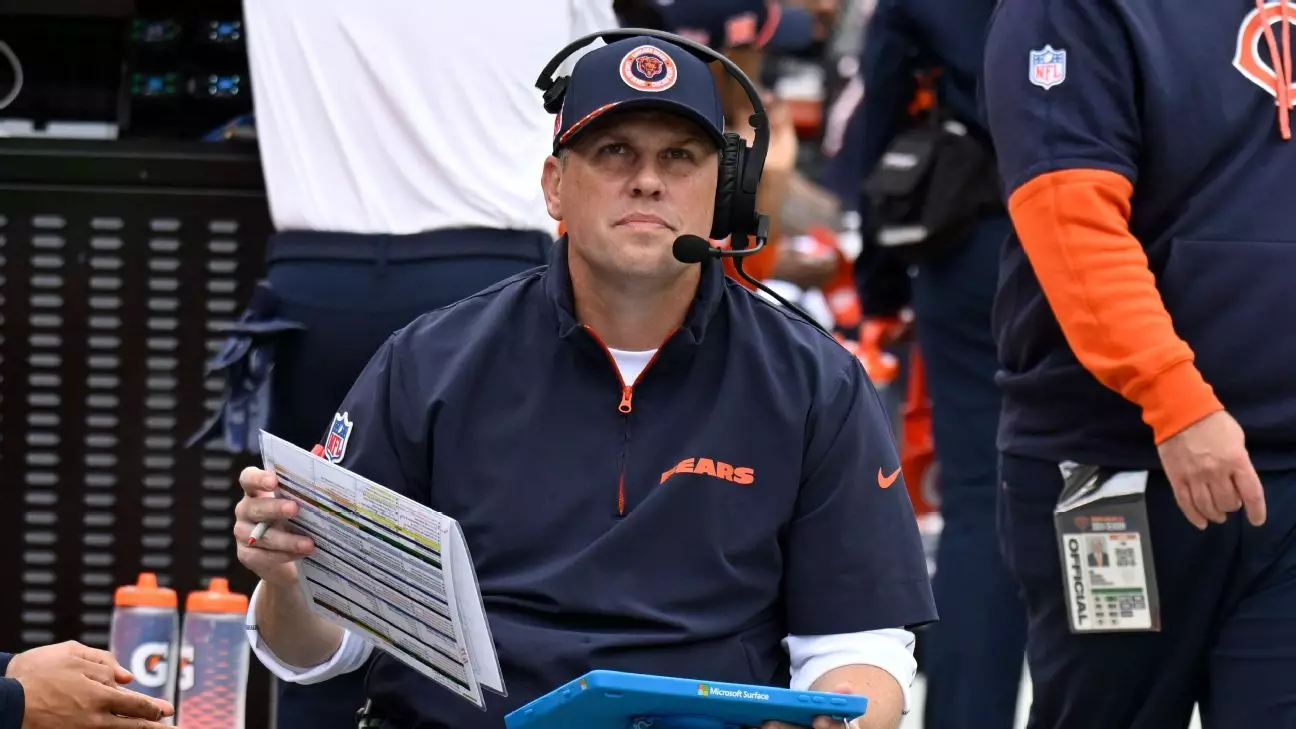The Chicago Bears have made a significant decision to shake up their offensive coaching staff, firing offensive coordinator Shane Waldron just ten months into his tenure. This move comes amid a wave of criticism regarding the team’s performance as they attempt to navigate a dismal season. The quick decision to part ways with Waldron illustrates the urgency felt by the organization as they grapple with underwhelming results this year.
In an announcement that echoed across the NFL, head coach Matt Eberflus expressed that “after evaluating our entire operation,” a change was necessary for the team’s progress. His statement emphasized a deliberate and respectful evaluation process, highlighting a critical aspect of leadership in professional sports: making tough decisions. Eberflus highlighted that changes were needed to facilitate improved performance from the team.
Waldron’s short-lived affair with the Bears began just this January, following a stint as offensive coordinator with the Seattle Seahawks. The decision to hire him seemed based on his previous successes, leaving many baffled as to why he was unable to translate that success to Chicago. The dismissal also reflects a growing trend in the NFL, where organizations are willing to make significant changes mid-season if results are not meeting expectations.
As the season progresses, consistency has been a major issue for the Bears. Currently, they sit with a record of 4-5, having lost three consecutive games and managed to score a mere 27 points across this losing streak. Such numbers are deeply troubling when one considers the lofty expectations surrounding the team earlier in the season. Critically, rookie quarterback Caleb Williams has struggled significantly under Waldron’s guidance, with statistics indicating a fall in performance that has implications not just for the player’s development but also for the team’s overall strategy.
The Bears are averaging just 277.6 yards per game, which places them at the bottom of the league across multiple offensive categories. The ultimate responsibility for these struggles typically falls on the shoulders of the coaching staff, particularly the offensive coordinator. Waldron’s inability to craft an effective game plan or to adapt to his players’ strengths played a vital role in his dismissal.
In the wake of Waldron’s dismissal, Thomas Brown has been promoted to offensive coordinator. His previous position as passing game coordinator has paved the way for this transition, in which the team hopes to see a revitalized offensive approach. Brown brings with him substantial experience, both in the NFL and at the collegiate level, which may serve the Bears well as they navigate the second half of the season.
Eberflus praised Brown’s “bright offensive mind,” which signifies confidence in the new coordinator to implement strategies that his predecessors could not. Brown’s prior experience includes coordinating the offense for the Carolina Panthers in a season that coincided with then-rookie quarterback Bryce Young, which suggests he has familiarity with developing young talent.
As the Chicago Bears move forward under Thomas Brown’s leadership, there remains both hope and uncertainty. On one hand, the change presents an opportunity for a fresh approach to the struggling offensive unit. On the other hand, the lack of continuity may lead to further disruptions in an already tumultuous season.
Ultimately, the effectiveness of this move will be judged by the Bears’ performance on the field in the coming weeks. Will Thomas Brown be able to mold Caleb Williams into a more effective quarterback and instill a cohesive offensive strategy? The fate of the Bears’ season may very well rest in the balance, and all eyes will be on how this transition unfolds.
The firing of Shane Waldron is a reflection of the high stakes present in professional sports where performance is paramount. The success and growth of the Bears’ offense will depend largely on how the team responds to this coaching shift and whether they can begin to reverse their current trajectory of underachievement.


Leave a Reply